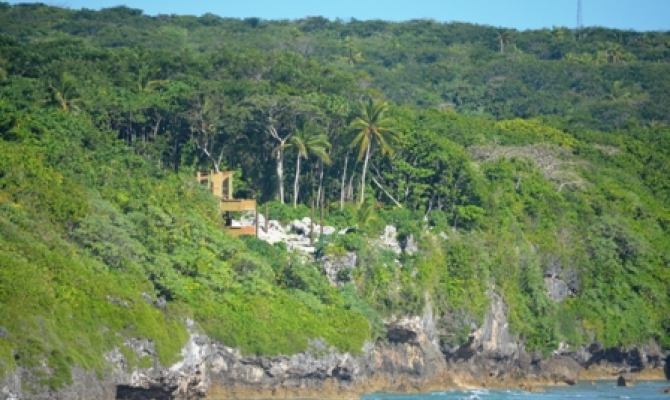
Climate Change Resilience
Teach a man to fish and he can feed his family, teach a man how to build and maintain water tanks and he can ensure continuous water supply for his family.
29 July 2014, Nadi, Fiji - How many small Pacific islands do you know of that have their own plastic manufacturing plant, enabling them to produce their own water tanks?
The Pacific island of Niue does thanks to a partnership between two Climate Change Projects, the Pacific Adaptation to Climate Change Project and the Global Climate Change Alliance: Pacific Small Island States Project.
Niue is a single island of raised limestone with a population of about 1,600 on an area approximately 260 km2.
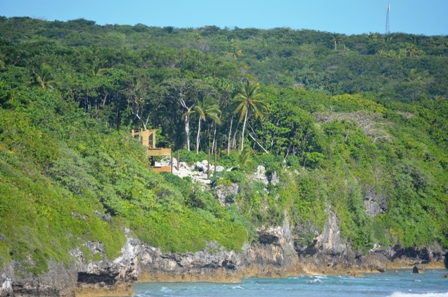
The island nation is part of the regional Pacific Adaptation to Climate Change (PACC) Project that started in 2009 and ends in December this year. PACC covers 14 Pacific island countries, helping to adapt to climate change by targeting one of the three key areas of food security and production, water resource management and coastal protection.
PACC is a multi-million dollar activity funded by the Global Environment Facility (GEF) and the Government of Australia. The United Nations Development Programme (UNDP) is the implementing agency and the Secretariat of the Pacific Regional Environment Programme (SPREP) is the implementing partner, responsible for coordination and overall project management.

"This Pacific-wide regional project is one of the very first that is bringing about tangible efforts on the ground, practical activities to help the 14 Pacific islands adapt to climate change," said Dr. Netatua Pelesikoti, the Climate Change Director of SPREP.
"While the project has been five years in implementation, it's actually taken much longer if you take into account the planning and preparation stages. To see the outcomes happen now and the difference this project is making upon the lives of Pacific island residents is all worth it."
For Niue the project has been about empowering their local communities with an adequate back-up system for access to water. Up until now, the residents have mainly relied upon groundwater pumped from the underground fresh water lens, which lies 30 - 60 metres below the surface.
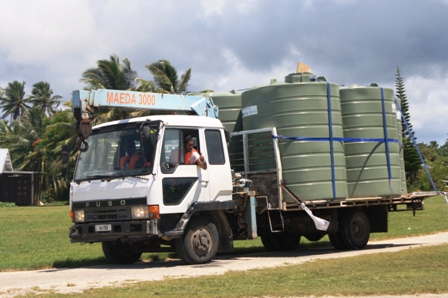
"While we have an underwater table of water, we rely heavily on electricity to source water from these bores, we also have households with water tanks from the 1970's and 80's that are difficult to clean, maintain and also are leaking," said Haden Talagi, the Niue PACC National Coordinator.
"These homes will constantly need electricity to access water. Another risk is the salt water intrusion due to the projected sea level rise impacting underground water quality. For those who currently have water tanks that gravity feeds into homes, they can't clean them and they don't have filters or first flush diverters."
Niue with additional assistance from the Global Climate Change Alliance: Pacific Small Island States project, funded by the European Union (EU) and implemented by the Secretariat of the Pacific Community, will provide additional rainwater tanks by up-scaling and replicating the PACC Project for homes in Niue with a 5,000 litre water tank with internal filters and first flush diverters, a cement base and installation covered by the projects.
Taking an innovative step, Niue decided to build their own manufacturing facility, purchase and construct the machinery to mould their own water tanks nationally, after a cost benefit analysis undertaken with support from the PACC regional team provided this as one of various options.
"We saved a significant amount of money by constructing our own facility which was more cost effective," said Talagi. In December 2013 the moulding plant was opened and since then over 500 water tanks have been manufactured.
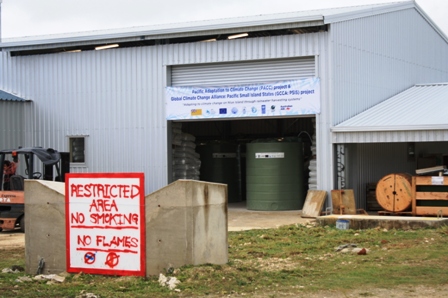
The moulding facility is capable of producing up to eight 5,000 litre tanks each day. The tanks are made of a robust plastic called high-density polyethylene (HDPE), which is imported in powder form before it is processed and moulded into tanks.
HDPE tanks have some significant advantages, they are lightweight, have no joints that can split, and the plastic material complies with New Zealand and Australian safety standards, it does not react with or contaminate the water in any way.
420 homes in Niue were identified to receive the water tanks, the criteria set by the project meant that government housing, agriculture sector and accommodation for tourists are not beneficiaries under the project, however 100 extra tanks were moulded for purchase facilitated by the Project. The Project also has the ability to produce more tanks if the demand is high
"We're at the stage now where we have completed 50% of the cement bases and just under 45% of the eligible homes now have water tanks that are fully connected and used by homes on Niue."
Rainfall in Niue is now the challenge with carrying out the project.
"Ironically it's the rain that's now our major challenge. We've had to rethink and used multiple contractors in multiple villages at the same time as we haven't been able to construct as many cement bases with the wet weather. We still anticipate all eligible homes will have water tanks installed and in use by December this year."
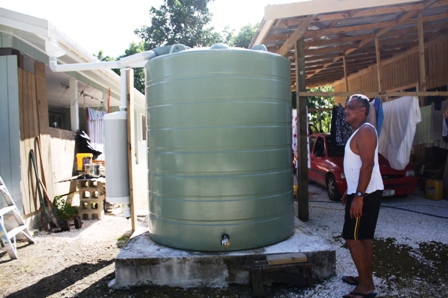
All of the water tanks will contain first flush diverters which filter the debris from the first few minutes of rainfall away from the tank, as well as water filters inside the tanks. The communities have also undergone awareness activities on the value of the tanks and training on system maintenance to ensure the tanks are kept in good order.
It's a story of success five years on from inception of the project in 2009 when the biggest challenge then was to seek co-financing to implement the project.
"At the start our big challenge was seeking additional funding, if we hadn't we would have had to import tanks from New Zealand and not all homes would have received them. If we had secured extra funds at the start, our approach would have been different, it would have been much easier in terms of management and implementation but we're on track now and seeing the results."
The PACC Project has resulted in a great legacy for the people of Niue, it's been the impetus for homes to receive installed water tanks free of charge, strengthening water security for the communities of Niue.
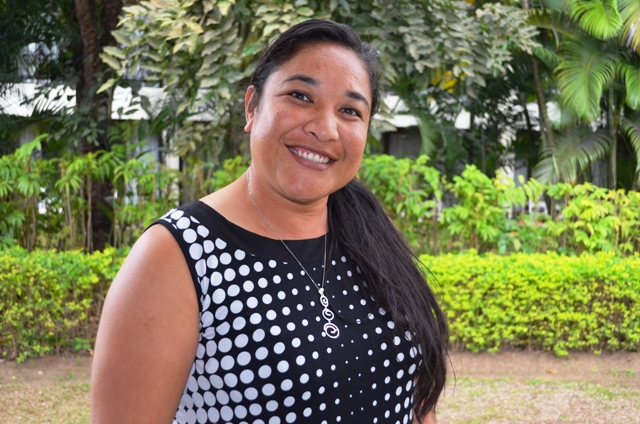
"It's really good to have this tank, the water supply to our house is very low and weak as it caters for everyone else - we're at the end of the line and there is always very little water and sometimes we'd go without water for up to two days," said Ms. Figo Kulatea, a resident of Alofi South in Niue.
"This new water tank has helped us a lot. It has been really good, so much so that we know the first water tank is free but we're looking at paying for a second tank as we know it will be a good investment."
The PACC Project has also been the catalyst for the new manufacturing plant that will now lead to future opportunities.
"Even though we have completed our target nationally under the PACC, we have the ability to manufacture more in the future. We can now mould other products made of plastic, saving us costs in the long term," said Talagi.
"As part of thinking ahead we're now working on securing funds for septic tanks as well as drums for exporting noni and honey instead of shipping these in. We can make them ourselves in Niue and export"
The PACC Niue ends in December this year and meeting in Nadi this week is the final gathering of all partners to review the last five years as the project wraps up. For the island of Niue it's a celebration of success.

"There's sustainability for long term use. We now have the facility, infrastructure and capacity to make it happen. Our Niue homes also have a back up water source. It has been a positive outcome from this project. This would not have happened without the generous support from the GEF, Aus-Aid and the EU."
The Pacific Adaptation to Climate Change Project countries are Cook Islands, Fiji, Federated States of Micronesia, Marshall Islands, Nauru, Niue, Palau, Papua New Guinea, Samoa, Solomon Islands, Tonga, Tokelau, Vanuatu. The 5th Multipartite Review Meeting of the Pacific Adaptation to Climate Change Projects is held in Nadi, Fiji from 28 July to 1 August.
Images courtesy of PACC Niue
29 July 2014, Nadi, Fiji - How many small Pacific islands do you know of that have their own plastic manufacturing plant, enabling them to produce their own water tanks?
The Pacific island of Niue does thanks to a partnership between two Climate Change Projects, the Pacific Adaptation to Climate Change Project and the Global Climate Change Alliance: Pacific Small Island States Project.
Niue is a single island of raised limestone with a population of about 1,600 on an area approximately 260 km2.

The island nation is part of the regional Pacific Adaptation to Climate Change (PACC) Project that started in 2009 and ends in December this year. PACC covers 14 Pacific island countries, helping to adapt to climate change by targeting one of the three key areas of food security and production, water resource management and coastal protection.
PACC is a multi-million dollar activity funded by the Global Environment Facility (GEF) and the Government of Australia. The United Nations Development Programme (UNDP) is the implementing agency and the Secretariat of the Pacific Regional Environment Programme (SPREP) is the implementing partner, responsible for coordination and overall project management.

"This Pacific-wide regional project is one of the very first that is bringing about tangible efforts on the ground, practical activities to help the 14 Pacific islands adapt to climate change," said Dr. Netatua Pelesikoti, the Climate Change Director of SPREP.
"While the project has been five years in implementation, it's actually taken much longer if you take into account the planning and preparation stages. To see the outcomes happen now and the difference this project is making upon the lives of Pacific island residents is all worth it."
For Niue the project has been about empowering their local communities with an adequate back-up system for access to water. Up until now, the residents have mainly relied upon groundwater pumped from the underground fresh water lens, which lies 30 - 60 metres below the surface.

"While we have an underwater table of water, we rely heavily on electricity to source water from these bores, we also have households with water tanks from the 1970's and 80's that are difficult to clean, maintain and also are leaking," said Haden Talagi, the Niue PACC National Coordinator.
"These homes will constantly need electricity to access water. Another risk is the salt water intrusion due to the projected sea level rise impacting underground water quality. For those who currently have water tanks that gravity feeds into homes, they can't clean them and they don't have filters or first flush diverters."
Niue with additional assistance from the Global Climate Change Alliance: Pacific Small Island States project, funded by the European Union (EU) and implemented by the Secretariat of the Pacific Community, will provide additional rainwater tanks by up-scaling and replicating the PACC Project for homes in Niue with a 5,000 litre water tank with internal filters and first flush diverters, a cement base and installation covered by the projects.
Taking an innovative step, Niue decided to build their own manufacturing facility, purchase and construct the machinery to mould their own water tanks nationally, after a cost benefit analysis undertaken with support from the PACC regional team provided this as one of various options.
"We saved a significant amount of money by constructing our own facility which was more cost effective," said Talagi. In December 2013 the moulding plant was opened and since then over 500 water tanks have been manufactured.

The moulding facility is capable of producing up to eight 5,000 litre tanks each day. The tanks are made of a robust plastic called high-density polyethylene (HDPE), which is imported in powder form before it is processed and moulded into tanks.
HDPE tanks have some significant advantages, they are lightweight, have no joints that can split, and the plastic material complies with New Zealand and Australian safety standards, it does not react with or contaminate the water in any way.
420 homes in Niue were identified to receive the water tanks, the criteria set by the project meant that government housing, agriculture sector and accommodation for tourists are not beneficiaries under the project, however 100 extra tanks were moulded for purchase facilitated by the Project. The Project also has the ability to produce more tanks if the demand is high
"We're at the stage now where we have completed 50% of the cement bases and just under 45% of the eligible homes now have water tanks that are fully connected and used by homes on Niue."
Rainfall in Niue is now the challenge with carrying out the project.
"Ironically it's the rain that's now our major challenge. We've had to rethink and used multiple contractors in multiple villages at the same time as we haven't been able to construct as many cement bases with the wet weather. We still anticipate all eligible homes will have water tanks installed and in use by December this year."

All of the water tanks will contain first flush diverters which filter the debris from the first few minutes of rainfall away from the tank, as well as water filters inside the tanks. The communities have also undergone awareness activities on the value of the tanks and training on system maintenance to ensure the tanks are kept in good order.
It's a story of success five years on from inception of the project in 2009 when the biggest challenge then was to seek co-financing to implement the project.
"At the start our big challenge was seeking additional funding, if we hadn't we would have had to import tanks from New Zealand and not all homes would have received them. If we had secured extra funds at the start, our approach would have been different, it would have been much easier in terms of management and implementation but we're on track now and seeing the results."
The PACC Project has resulted in a great legacy for the people of Niue, it's been the impetus for homes to receive installed water tanks free of charge, strengthening water security for the communities of Niue.

"It's really good to have this tank, the water supply to our house is very low and weak as it caters for everyone else - we're at the end of the line and there is always very little water and sometimes we'd go without water for up to two days," said Ms. Figo Kulatea, a resident of Alofi South in Niue.
"This new water tank has helped us a lot. It has been really good, so much so that we know the first water tank is free but we're looking at paying for a second tank as we know it will be a good investment."
The PACC Project has also been the catalyst for the new manufacturing plant that will now lead to future opportunities.
"Even though we have completed our target nationally under the PACC, we have the ability to manufacture more in the future. We can now mould other products made of plastic, saving us costs in the long term," said Talagi.
"As part of thinking ahead we're now working on securing funds for septic tanks as well as drums for exporting noni and honey instead of shipping these in. We can make them ourselves in Niue and export"
The PACC Niue ends in December this year and meeting in Nadi this week is the final gathering of all partners to review the last five years as the project wraps up. For the island of Niue it's a celebration of success.

"There's sustainability for long term use. We now have the facility, infrastructure and capacity to make it happen. Our Niue homes also have a back up water source. It has been a positive outcome from this project. This would not have happened without the generous support from the GEF, Aus-Aid and the EU."
The Pacific Adaptation to Climate Change Project countries are Cook Islands, Fiji, Federated States of Micronesia, Marshall Islands, Nauru, Niue, Palau, Papua New Guinea, Samoa, Solomon Islands, Tonga, Tokelau, Vanuatu. The 5th Multipartite Review Meeting of the Pacific Adaptation to Climate Change Projects is held in Nadi, Fiji from 28 July to 1 August.
Images courtesy of PACC Niue